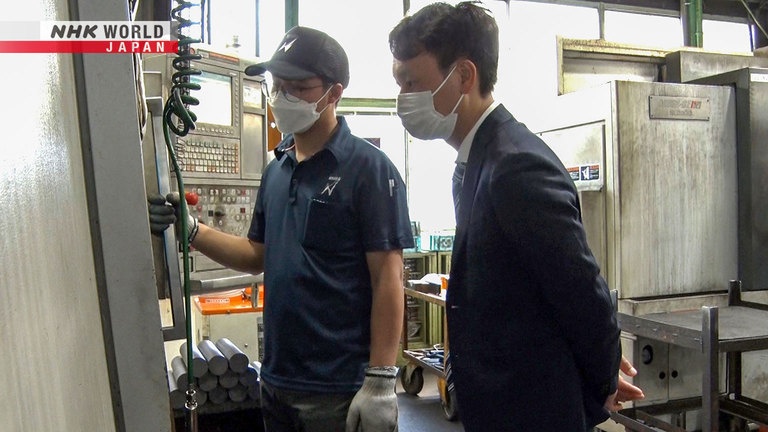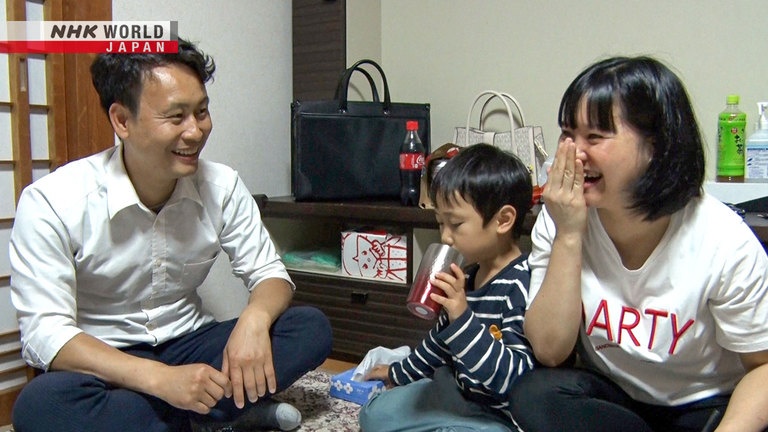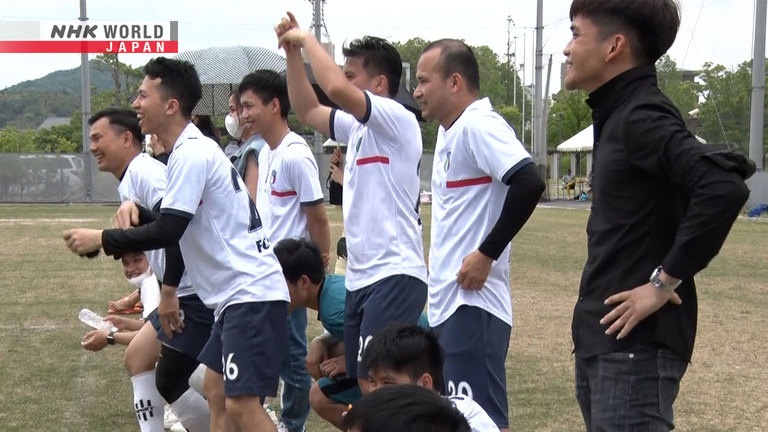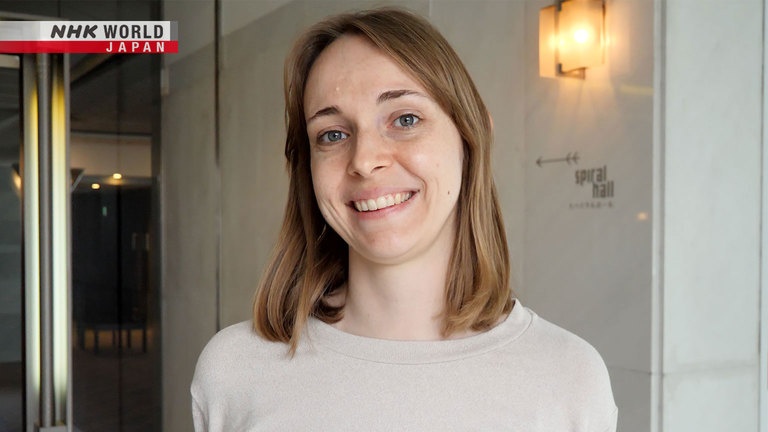Bridging Cultural Gaps in Work and Life
This time, we visit Shimane Prefecture to meet Vietnamese Pham Van Toi, the president of an agency that finds employment for his fellow countrymen and women who wish to work in Japan. Toi also helps them get used to life in Japan and overcome linguistic and cultural barriers. We join Toi as he organizes a soccer event to bring the Vietnamese and Japanese communities closer. We also follow French-born Sophie Lekens for a day in her work in public relations for an arts center in Aoyama, Tokyo.




Transcript
Where We Call Home.
To Vietnamese moving to Japan, one fellow countryman is like a big brother.
Thirty-nine-year-old Pham Van Toi, who runs an employment agency.
Toi finds work for Vietnamese expats.
He also provides a range of support to help them adapt to their country of adoption.
Some can't communicate well in Japanese.
It impacts their work and daily lives.
Cultural and language barriers can make life hard for Vietnamese workers.
To prevent them from falling into isolation, Toi organizes all kinds of events and activities.
My biggest dream is for Vietnamese
and Japanese to understand each other.
Let's follow Toi in his efforts to bridge the gaps between Vietnamese workers and Japanese society.
About six hundred kilometers west of Tokyo is the city of Matsue in Shimane Prefecture.
For four centuries, the castle town prospered under industries such as steel manufacturing.
At the helm of an employment agency connecting Vietnamese workers and local businesses is Pham Van Toi.
Today, he visits a young man to see how he's adapting to his new workplace.
Hi!
This is a manufacturer of automobile and industrial printing parts.
Toi's agency helps with the major issue of labor shortages in the region's main industries
like metal processing and electronic parts manufacturing.
You're hard at work!
Hao has been working here for three months.
With wages in Japan higher than in Vietnam, he decided to leave his homeland to find employment here.
How's work?
It's good. I've got no complaints.
Let me know if you have any issues.
- People in this company are nice.
- Yes.
Hao completed a technical course at university in Vietnam.
Here, he's in charge of operating an automatic lathe that shaves metal.
Toi's firm introduces workers like Hao with specialized expertise and technical skills to Japanese companies.
I miss my wife and kids.
Once I settle down here,
I want them to come live with me.
Once he gets used to his work,
he wants to take the next step.
He's got clear goals and ambitions.
I'll keep supporting him so that
he likes Japan more and more.
Gotsu is a town about a two-hour drive from Matsue.
This is where Toi set up his agency six years ago.
The staff is comprised of four Vietnamese and two Japanese.
They find potential employees that meet the needs of hiring businesses, and mediate through the interview process.
They also assist with visa applications.
Toi also puts particular effort in providing thorough support to workers after they are hired.
So far, the company has introduced some two hundred workers
for businesses in fields like construction and caregiving in and out of Shimane.
Quit rates are low and employers are satisfied.
Some can't communicate well in Japanese.
It impacts their work and daily lives.
We put in all our efforts to help improve
their situation as much as possible.
4:00 a.m. – Toi heads out to welcome three Vietnamese who are about to arrive in Japan.
He's making a five-hour drive to Fukuoka Airport.
He explains that the period after expats first arrive is crucial to help them get used to life here.
They come all the way from Vietnam.
So, we want to provide them
with warmhearted support.
Hi everyone!
Fresh off the plane, the trio has been waiting for Toi.
They registered with his agency, which found them jobs at the same construction company.
- Have you received your residence cards?
- Yes.
So handsome!
Each of them came with hopes and dreams.
The oldest of the three is Son.
I want to build a house in Vietnam
and get married.
They arrive in Hiroshima Prefecture for a first meeting with their new employer.
Sugisawa Takahiro will be their supervisor.
Pleased to meet you. I'm Son.
I'm from Dak Nong Province in Vietnam.
I turned 30 this year.
The three have already been assigned to work on-site on the interior construction of an apartment building.
- Can you understand most of what I say?
- Yes.
He says he hopes you'll study not only
how to speak Japanese...
but also how to read and write.
I know you're up to the task.
I hope you'll give it your best.
With the formalities out of the way, they're all set.
Next, they visit the company dormitory.
Toi also provides support in the workers' everyday life.
He makes sure the rooms are all in order.
It's got a washing machine.
Lots of storage space!
You're in room 201.
As they're about to start their new life in Japan, the three are filled with anticipation.
Toi and our employer set us up
with a good work environment.
I'm very grateful.
Once they start work, some issues
will likely come up.
Mainly communication-related issues.
We'll do our best to help resolve them.
I'm home!
With his office in Gotsu, Toi can be at home in Matsue for only about two weeks every month.
The time he can spend with his family is invaluable.
His wife Anh welcomes him with an authentic Vietnamese home-cooked meal.
The two met when they were in university.
They say it was love at first sight.
He's so kind...
and handsome.
And you're pretty.
No, I'm not.
Of course you are.
More than ever!
The support of his family is what keeps Toi going.
He understands the importance of having a place to rest one's tired heart and mind when work gets tough.
Toi has far too often seen fellow Vietnamese who were unable to adapt to life in Japan quit their jobs.
Some even resorted to crime to survive.
Many Vietnamese got in trouble.
Some shoplifted...
or got into fights.
We'd see it on the news every day.
It was embarrassing.
Instead of at the TV, people looked at me
and other Vietnamese workers.
Wishing to change that, Toi called out to his acquaintances and organized events for Vietnamese
to learn Japanese customs and talk freely about their worries.
Word got around that I could
provide support to fellow Vietnamese.
Many people I didn't know...
came to me for advice
or to ask for help.
Toi wanted to become a bridge between Vietnamese workers and Japanese society.
He founded his agency in 2017.
One man provided assistance in making Toi's project a reality.
Yokota Manabu once directed the Chinese branch of a major electronics manufacturer.
As industries in his hometown faced labor shortages, he felt the need for help from people like Toi.
Yokota knocked on the doors of business owners he knew
and local government organizations to find clients for Toi's company.
This region is in dire need of workers.
We need an environment fit not only
for workers from Japan...
but also from around the world.
His talent and motivation fit perfectly
with my wish to invigorate the region.
Toi knows the importance of creating occasions for his fellow countrymen and women to cultivate social ties,
and pours effort into helping them enjoy life in Shimane.
Four years ago, he began organizing soccer tournaments.
Instead of focusing on work all the time,
they also need to have a fulfilling life.
We want to help them enjoy life here,
so that they'll want to stay.
Today, the employer of a Vietnamese worker Toi introduced asked him to come over.
This is a care facility in Matsue City.
Yen has been working here for about six months.
She's very popular with the facility's users, but recently, she seems to lack energy.
- Some warm tea?
- Thank you.
Drink slowly.
Worried for Yen, her colleagues asked Toi to mediate as they discuss her situation.
Is there anything that worries you
about your work?
I have trouble staying motivated.
I have no goals.
On my days off, I sleep all day.
With few opportunities to meet other Vietnamese, she tends to shut herself in at home.
Toi makes a suggestion.
We have a soccer tournament on May 28.
I have to work that day.
Take the day off.
Thank you.
Eager to help Yen regain her enthusiasm at work, her supervisor decided to let her take the day off.
The soccer event is coming soon.
As preparations are well underway, Toi wants to make the tournament an opportunity for Vietnamese and Japanese to meet.
Last year, only one Japanese team participated.
He hopes more will join this time.
Do we have only one Japanese team?
I'm checking to confirm
whether more will join.
Toi counts on his Japanese acquaintances to find more participants.
The day of the tournament.
A total of six Vietnamese teams from in and out of the prefecture are here,
along with two Japanese teams excited at the thought of enjoying friendly matches with players from another country.
Let's all have a great time together!
But don't go easy. Play to win!
They kick off the first match.
When they score a goal, the Vietnamese rejoice.
Yet, even when they miss, they still shout in excitement.
Everyone has a blast.
Vietnamese and Japanese players interact.
- Are you OK?
- Yes. No worries.
- Do you ever play with Vietnamese?
- No, this is a rare chance.
They cheer even when they miss.
It's great!
It's fun to meet through sports.
I feel we can connect
better than through talking.
Yen is here.
Yen, the care facility worker, came to take advantage of this chance to meet fellow Vietnamese.
I'm up.
Yen's colleague who had been worried for her is here, too.
Nice!
So close!
Yen too is enjoying the game.
Toi goes on the offensive.
His team won this match.
How long can you stay?
- Watch us. We'll win again.
- Good luck!
- You just played 2 minutes.
- Not even 2!
Vietnamese are cheerful.
Japanese are quiet.
Is it the national Vietnamese character?
I like the cheerfulness. It's fun!
For Yen, this is a perfect and well-deserved change of pace.
There were many Vietnamese.
I hadn't met so many people like this
in a really long time. It was fun.
I hope I can come next time.
Many workers who come here
lose their sense of purpose.
To encourage them to set
and pursue their goals...
I'll keep providing them
with the support they need.
Today, Toi holds a welcome party for the trio he greeted at the airport.
When the going gets tough, knowing they are not alone makes a huge difference for the Vietnamese who come to Japan.
Toi continues to lend a hand to help them pursue their dreams and put down roots in their country of adoption.
Hi. I'm Sophie.
I work for an arts center in Tokyo.
I'll show you my work
in public relations.
Follow me!
This is a fashion hub in Japan's capital.
This center organizes a broad range
of art and cultural events.
9:00 a.m.
arriving at work.
Sophie is in charge of promoting
a variety of events.
She's now preparing an annual show
that supports budding artists.
These pieces feature traditional
Kyoto handcrafting techniques.
They suit contemporary fashion nicely.
They're really lovely pieces.
These are 3D-printed pieces
by product designer Leo Koda.
He uses a 3D printer to produce sheets.
Now, if you boil it...
it starts to swell up.
It's now become plump.
11:00 a.m.
the event starts.
Wow!
It's like rice cake that
swells up when heated.
This gives me ideas for my own creations.
It's hard...
but light.
It's surprisingly light.
This event is great because
artists of all genres take part.
Each booth has a different atmosphere.
For example, next to a traditional
Japanese painter...
we find an artist who uses 3D printing,
an architect, or a designer.
It's a chance to experience
different worlds...
that we can't see if we simply go to
a solo exhibition by an artist we know.
The PR team creates all kinds
of content for the event.
Does it need to be at 1 p.m.?
How about 2 then?
That way you can sleep until late.
Today, Sophie streams a live interview
with product designer Leo Koda.
You give a lot of importance
to the materials you use.
I use biodegradable materials.
Many followers viewed it.
I'm glad.
Keep up the good work.
In her teens, Sophie learned about Japan
through woodblock prints.
She later learned that western artists
had been inspired by Japanese prints.
Impressionists liked the simple lines.
The idea is that the artists
depicted what they felt...
instead of reproducing the landscape
in a photographic way.
I wanted to know how contemporary art
in Japan evolved from woodblock prints.
In 2012, Sophie first came
to Japan to study Japanese.
Then she worked 3 years
at a contemporary art gallery.
In 2016, she wanted to broaden her range
of work and found her current job.
This is my senior in the PR team,
Asano-san.
She's so earnest.
Soon after she joined, she wrote
a project proposal. I was impressed.
She's also very modest.
It's amazing.
I only know work in Japan.
I'm French on the outside,
but when it comes to work...
I'm more Japanese, I guess.
I don't do it consciously.
This is my collection
of "kokeshi" dolls.
I love their simple shapes...
their quiet expressions and
the few lines to depict their kimonos.
In Japan, they're considered folk art,
and not fine art.
But we can see each doll has
its originality. They "are" fine art.
I love them.
They're my treasures.